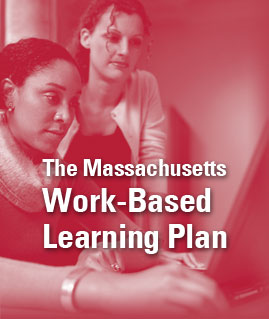Back to Report Introduction
Massachusetts Work-Based Learning Plan
Skill Gain Study
Summer 2007
How can employers and youth service providers maximize the benefits of work-based learning experiences?
The Work-Based Learning Plan can be an effective tool for opening up conversations about job expectations and skills, benefiting both the employer and the participant.
The analysis shows that skill gain was HIGHEST for:
- Participants whose WBLPs had longer-than-average job descriptions and skills/tasks descriptions;
- Participants whose WBLPs had longer-than-average written goals and comments;
- Participants whose job titles included the word “intern”;
- Participants who were in programs in which employers provided jobs/internships for two or more participants.
These findings DON’T suggest that you have to “write a lot” in the Work-Based Learning Plan, or use the word “intern” in the job title, or set up work-based learning experiences for two or more students per employer. But these findings DO suggest that:
- Any time and effort put into using the Work-Based Learning Plan effectively results in higher skill gain. The number of words in the WBLP was a measurable factor that was correlated with higher skill gain. Other (less measurable) factors that contribute to skill gain would include the formal and informal conversations that result from the WBLP process and the process of reading about and reflecting on the expectations of the workplace and the skills needed.
- While all jobs represent valuable learning experiences, jobs/internships that are set up as formal learning experiences result in especially strong skill gains.
The "Implementing the Massachusetts Work-Based Learning Plan" manual and other Work-Based Learning Plan resources provide suggestions for setting up work-based learning experiences and for effectively using the Work-Based Learning Plan. See these resources online at http://skillslibrary.com/wbl.htm or contact Keith Westrich at kwestrich@doe.mass.edu for more information.
SKILL GAIN - BY # OF WORDS IN WBL PLAN |
| ALL SKILLS | 1st Review | 2nd Review | Average Change | Number of Plans |
| Job description plus specific skills/tasks have 1 - 90 words | 3.33 | 3.74 | .41 | 229 |
| Job description plus specific skills/tasks have more than 90 words | 3.25 | 3.91 | .66 | 119 |
| Goals / Comments have 1 – 33 words | 3.20 | 3.56 | .36 | 114 |
| Goals / Comments have 34 words or more | 3.43 | 3.97 | .54 | 119 |
|
* Note: The job descriptions, skills, goals and comments were not available electronically on some of the WBL Plans, so these WBL Plans were omitted from this part of the analysis. |
OTHER EXPERIENCES WITH ABOVE-AVERAGE SKILL GAIN |
| Participants in programs in which there were many "multiple placements"* | 3.30 | 3.99 | .69 | 103 |
| Job title includes word “intern” | 3.65 | 4.19 | .54 | 69 |
| Entrepreneurship Programs | 2.8 | 3.5 | .74 | 16 |
| Restaurant / Culinary | 2.8 | 3.5 | .72 | 44 |
| Health Services | 3.5 | 4.1 | .69 | 27 |
| ALL WBLPs | 3.33 | 3.85 | .52 | 433 |
| * Refers to programs in which a high proportion of participating employers provided two or more placements ... these are generally "formal" work-based learning opportunities, such as summer jobs programs or well-established internship programs. Other industries with high skill gain (but a sample too small to include here) include journalism and construction trades. |
Read More

